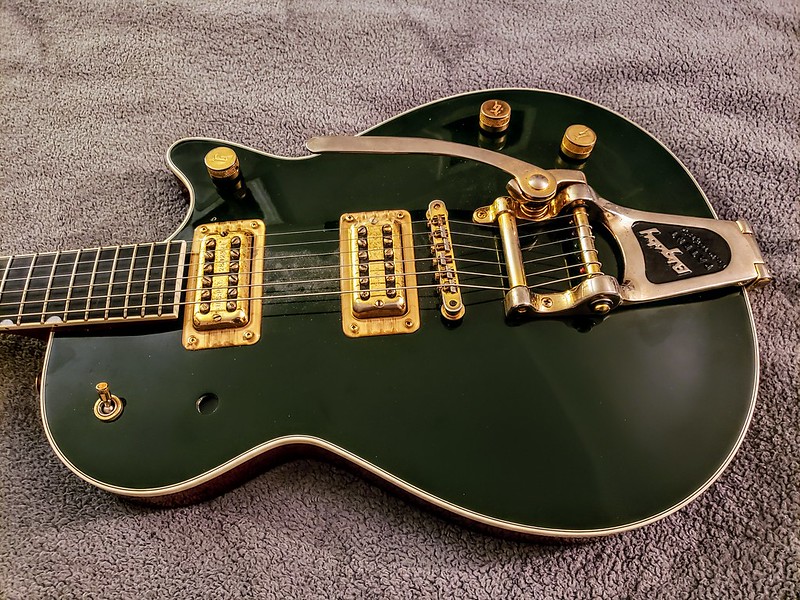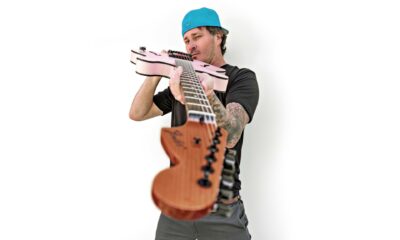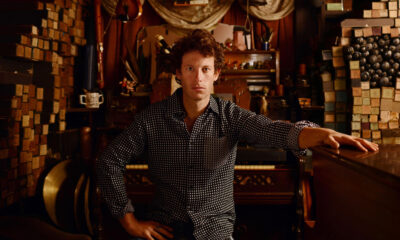Alternative/Rock
Geared Up: David Waters Discusses His Gretsch Duo Jet Guitar
With guitar by far his weapon of choice, we recently connected with David Waters for a Geared Up interview in which we discussed his Gretsch Duo Jet electric guitar.
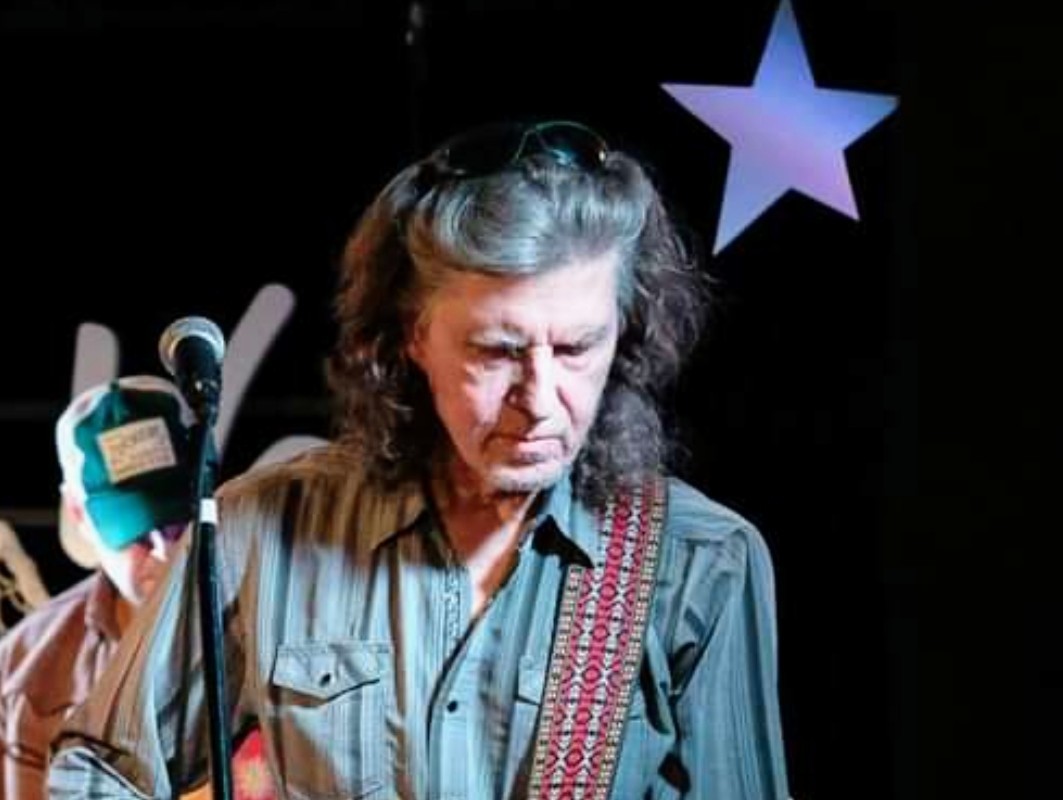
When it comes to David Waters the musician, it’s a lot of no muss and no fuss. It’s just honest to goodness, old-fashioned guitar rock, honouring many of his rock n’ roll heroes, such as Pete Townsend, Tom Petty, David Gilmore, and Neil Young. Waters has released several singles over the last year, as part of his outlaw blues outlet known as The Waters Project. The band’s latest single “It’s What You Do To Me” is an interesting song, examining the contrasts between what someone may feel ok with when expressing their love for someone, and the secret passions that we may not want to admit, or even accept.
Originally founded in 2014 in New York City, the original intention behind The Waters Project was for it to be David Waters’ creative outlet for all of the original music he has been writing over the last few decades as an in-demand live and session guitarist. Earlier in his career, he was content with serving as a supporting piece for many fellow songwriters in his native Cleveland, as well as Boston and New York City. Eventually, he decided to finally give his own band a go, and after assembling a crew of fellow NYC area musicians, The Waters Project was born.
With guitar by far his weapon of choice, we recently connected with Waters for a session of Geared Up in which we discussed his Gretsch Duo Jet electric guitar, what he loves about it, and how it’s been integral to him developing and expanding the band’s sound.
What one piece of gear do you use to obtain your signature sound?
David Waters: “I really love my Gretsch Duo Jet electric guitar. It’s a G6128T-EE from 2005. The cool thing about it is that it’s a signature model that Eliott Easton of The Cars designed with some savvy design modifications that really set it apart from the standard models. The other key connection is that Eliott is a personal friend, and he was happy to hear I was appreciating his approach to what a guitar should be.”
How did you come to possess this guitar? Vintage shop, regular shop, borrowed money, gifted. Give us the details..
“I’d been aware of this model and had been hoping to stumble on one so I could try it out. One day (a few years ago), I walked into Rudy’s Music in Soho in New York City to say hello to Rudy and my pals that worked there…. and it was hanging on the wall. Rudy and I sat down with it, had some laughs, played it back and forth for each other, and then Rudy made me an offer I couldn’t refuse. Out came the Amex (laughs).”
What made you chose this particular guitar and were there any close seconds or alternates?
“Gretsch guitars have always held a mysterious, favourite place in my heart without ever playing one on stage…. I’d owned them before, but never played one out live. Many of my heroes and friends swore by them. I’d always been a Tele/Strat/Les Paul guy. Once I actually plugged one in I was stunned at how musical, tone-full, dynamic, and huge it sounded.”
What about your Gretsch guitar makes it so important to you?
“This guitar, and Gretsch electrics in general, have this ‘full spectrum sound’ (their website’s definition which I love) which in my ears appears as being almost 3-D on stage. Its just wider and deeper dynamically and really rich in harmonics. The tone really opens up and stands out in a dense mix whether your playing metal, hard rock, jazz, country… really any style. Elliot also made a key mod to his model with a 25.5’ Fender scale length neck which really enhances the sustain and ring of the guitar. Makes it super easy to switch over to my Tele as well.”
Did you use this Gretsch during the recording of “It’s What You Do To Me?”
“I’ve used my Gretsch on most of my recordings for at least three years. I’ll drop the initial basic guitar tracks to start the song off in the best sonic way possible and set the rest of the tracking up, whether a Strat or Tele, or continue with the Gretsch for other guitar hooks or lead work. I try to not lay down or layer too many tracks of the same part. Keeping each track/part in it own ‘sonic’ lane is key. Again, the beautiful magic with the Gretsch is that no matter how many tracks I lay down, you can always hear the Gretsch in a very musical, articulate sense. You don’t need to fuss too much, it fills up a lot of space.”
Do you have a special way that you recreate your album tones in a live setting, or is it more just plug-and-play?
“Our live performances of the recordings are stripped down to essentials. That’s why I don’t like to over-orchestrate the recordings… knowing that they’re going to have to still be powerful and grab the listener emotionally. We take on a pretty raw ‘garage band’ aggressive attitude live while still paying respect to the recorded songs. The arrangements are really dialed in. I like concise, classic song structures, but we like to explode on ‘impact’ when it feels right.”
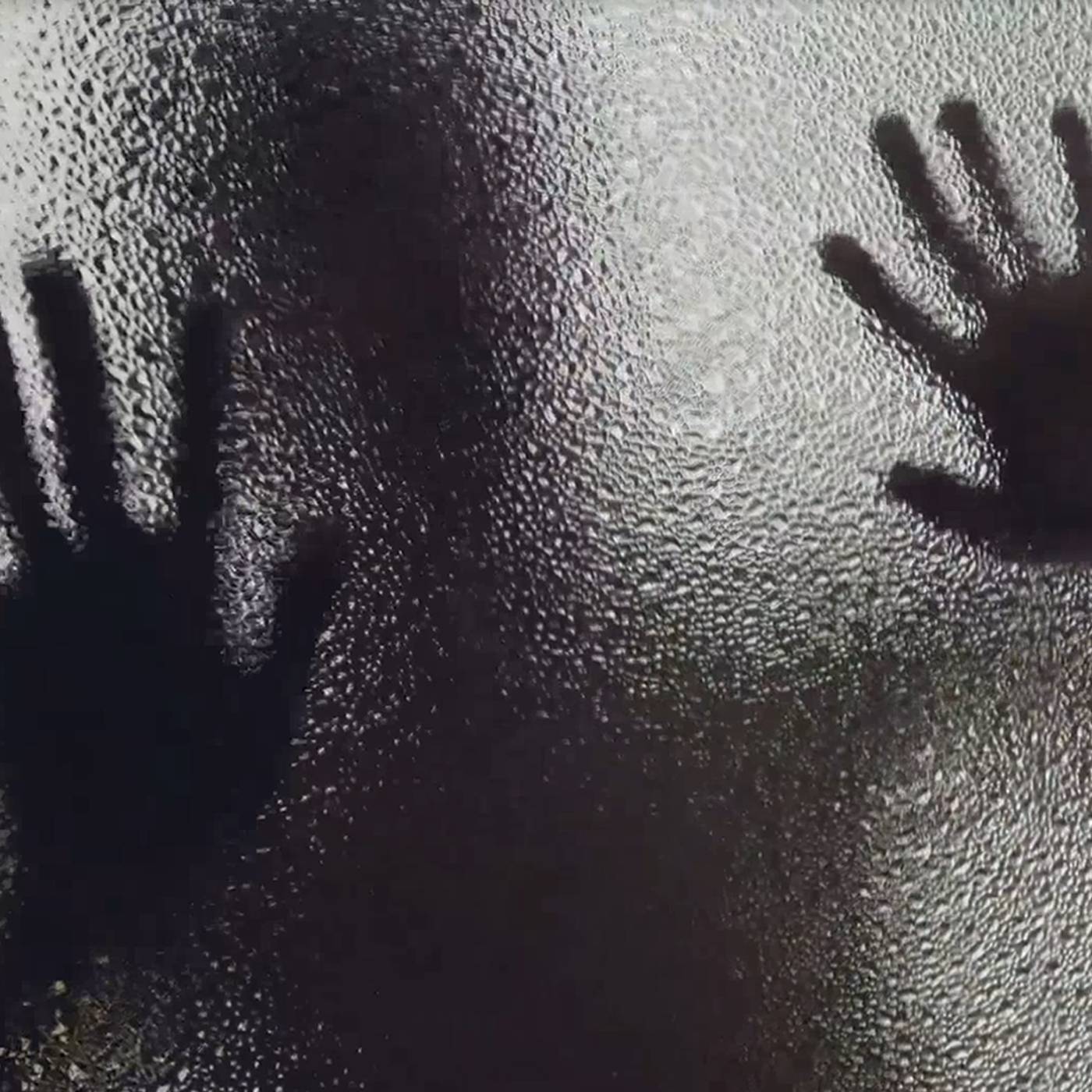
Artwork for the single “It’s What You Do To Me” by David Waters
We know you love this guitar, but are there any major cons? (Ok, now you can also list the pros.)
“I really can’t think of any cons except maybe, if I break a string, the Bigsby vibrato might go out of tune. That and I wouldn’t throw it across a stage like a Strat or a Tele (done that) because I might snap off the headstock. Fenders are pretty indestructible. But that’s why I always have a back up Tele on stage. A couple other major ‘PRO’ features beside the Fender scale length I mentioned is that the Jets body has hollowed tone chambers under the laminated/arched top which are what make the guitar so sonically amazing, and these chambers also lighten up the body a bit, compared to a Les Paul.
“The other cool feature is that it has a fixed tunamatic bridge like a Les Paul, rather than the traditional floating bridge which really changes the entire guitars ergonomics, as well as the sustain and attack. Gretsch Guitars is now offering a line of Jets that have this same bridge set up. Stunning new guitars.”
If you could, or wanted to (maybe you don’t at all, and that’s cool), what would you tweak or mod on this particular guitar?
“Well… I already did some of my own mods… .most Gretschs have a tone switch right next to the pickup selector switch that originated back in their original design. This switch is debated in forums and backrooms all the time. I simply removed it by dropping it into the body of the guitar, which leaves the pickup selector all by itself making it much easier to grab in the middle of a song, no confusion. I also removed the truss rod cover and keep it off to make it easier and quicker to adjust the rod when needed. Very few adjustments needed. The neck is stable as a mountain.”
How easy is it for you to tweak this guitar and get the tone/sounds you need?
“Very little ‘tweaking’ needed. The moment I plug it in I know what I’m in for. Its why I love the guitar. No surprises, nothing to worry about or distract from the music.”
How does the Gretsch hold up with regular touring and gigging?
“Again, the guitar is not a closet queen needing any sort of TLC. I make sure it always has fresh string and is ready to rock ahead of the set. I don’t polish it before or after gigs. I like seeing the build up of all the energy and passion I put into performing with it. Dings, dust, debris, blood, sweat, and maybe even an occasional tear or two…. It’s a warrior.”
Do you have a backup for this guitar?
“Yes, I’ll always keep my Tele on stage as back up. The Tele, a custom shop fender I designed for Fender, is incredible in its own right. Really close cousin to the Gretsch tonally.”
Time for some fun. Give us your best “gear goes wrong” story.
“One night I was playing a show in Boston and was using an Ibanez RG550 for a special part on one song where I needed to really knock out some hairy dive bomb sounds. Think Hendrix meets Eddie… I accidently broke off the trem arm mid ‘bomb,’ then used it as a weapon to stab the shit out of the top of the guitar and somehow lost my self in the moment, while the band continued to play and wonder what I was doing. I took off the guitar, because I was pissed, and threw it across the stage into the PA stack while the audience stood there cheering me on. Grabbed my #1 guitar and kept playing without missing a beat. Was a lot of fun. The Ibanez was a bit worse for the wear so I gave it to my little brother. He still has it.”
Any final thoughts or comments on your Gretsch guitar?
“In my honest opinion, guitars are tools. They are certainly beautiful and inspirational to connect with, especially in a way to feel close to our guitar heroes, but in the end, they don’t make music unless you play them and even better, play them with other people in a band. I’ve grown out of the collecting every pretty guitar I’ve wanted or ‘it’s an investment’ mind set. I don’t need 50 hammers or screw drivers, I need one or two good ones of each, just like guitars. Each one, to me, needs to serve its unique musical identity or role for inspiring my song writing and performing. I’m about chasing songs and creating music that means something to me. Having a few great guitars to work with is all I need. Any more than that is a distraction.”
-

 Music1 week ago
Music1 week agoTake That (w/ Olly Murs) Kick Off Four-Night Leeds Stint with Hit-Laden Spectacular [Photos]
-

 Alternative/Rock2 days ago
Alternative/Rock2 days agoThe V13 Fix #011 w/ Microwave, Full Of Hell, Cold Years and more
-

 Alternative/Rock1 week ago
Alternative/Rock1 week agoThe V13 Fix #010 w/ High on Fire, NOFX, My Dying Bride and more
-

 Features1 week ago
Features1 week agoTour Diary: Gen & The Degenerates Party Their Way Across America
-

 Culture2 weeks ago
Culture2 weeks agoDan Carter & George Miller Chat Foodinati Live, Heavy Metal Charities and Pre-Gig Meals
-

 Music1 week ago
Music1 week agoReclusive Producer Stumbleine Premieres Beat-Driven New Single “Cinderhaze”
-

 Indie2 days ago
Indie2 days agoDeadset Premiere Music Video for Addiction-Inspired “Heavy Eyes” Single
-

 Alternative/Rock2 weeks ago
Alternative/Rock2 weeks agoThree Lefts and a Right Premiere Their Guitar-Driven Single “Lovulator”

